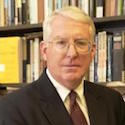“Jeffersonian Constitutionalism”: Dinner Lecture with Rice University Prof. John Boles
01/01/1970
Constructing a story of Thomas Jefferson’s contributions to defining the purposes and powers of government, and to defending the liberties of citizens, could begin in any number of places, but for Rice University William P. Hobby Professor of History John Boles’ April 10 Town & Gown Dinner Lecture, that starting point was 1776 Philadelphia, during the Second Continental Congress. Why? Not, as one might expect, because the convention led to the adoption of the Declaration of Independence, but instead because of Jefferson’s desire to leave Philadelphia for Williamsburg, in order to be present for the drafting of the first Virginia Constitution. Jefferson, Prof. Boles added, would ultimately settle for sending notes south, and they would arrive too late to be integrated into his home state’s framing document.
These notes, though, and later variations on them, would be instrumental in shaping Jefferson’s legacy. Included among his recommendations were provisions that called for: separation of the legislative, executive, and judicial branches, as well as the formation of a bicameral legislature in which the popularity of the House was balanced by the wisdom—and, importantly, not the wealth—of the Senate; universal suffrage for all white males; required purchase of land from indigenous peoples; and religious freedom and freedom of the press. Many of these points were underscored in his 1783 proposed revisions to the state constitution, which were published as an appendix to his famous Notes on the State of Virginia, and which also called for: free public education for men and women; the development of a penitentiary system and significant restrictions on capital punishment; and the abolition of the importation of slaves into Virginia, with the near-term goal of emancipation and colonization.
Zooming out, Jefferson’s ideas about both the structure of government and the rights of citizens likewise informed his thinking about the national constitution. As Prof. Boles described, Jefferson believed the Articles of Confederation fine, if the goal was to remain a confederation of states, but that building a stable republic would require addressing the Articles’ shortcomings when it came to levying taxes, entering into foreign treaties, and regulating western expansion, among other things. And while Jefferson was excited about the intellectual spirit guiding the Constitutional Convention—if not actually present for it—he was disappointed by the end result on two primary counts: the lack of an executive term limit (he described the Constitution as likely to produce “a bad edition of a Polish King”); and the lack of a Bill of Rights.
After noting how the second of these anxieties was quickly resolved, Prof. Boles shifted focus to debunking Jefferson’s overstated reputation as a strict, states’ rights constructionist. Much of this reputation, he posited, is derived from the Kentucky Resolution; and while Jefferson did use the Resolution to demand that states be permitted to nullify laws in instances when the federal government had trespassed its designated limits, this proposition was made, Prof. Boles argued, primarily in defense of individual civil liberties. Moreover, he noted how Jefferson also demonstrated a willingness to finesse and expand federal agency. Take, for example, the case of the Louisiana Purchase. While territorial acquisition of this extent was not a power delegated to the federal government by the Constitution, Jefferson still supported the Purchase on the grounds that legislators should—and, in fact, must—consider strict observance of written law in relation to higher necessity. And this was not, Prof. Boles concluded, a fast-and-loose stretching of the constitutional seams but rather indicative of Jefferson’s abiding belief that laws should evolve hand-in-hand with progress and that opportunity would sometimes require revisiting and revising the nation’s original governing document.
 The William P. Hobby Professor of History at Rice University, John B. Boles received his Ph.D. in History from University of Virginia and held professorships at Towson State College and Tulane University before returning to Rice, where he studied as an undergraduate. He is the author or co-author of ten books, most recently Jefferson: Architect of American Liberty (Basic Books, 2017), and the editor of many more, including Seeing Jefferson Anew: In His Time and Ours, with Randal L. Hall (University of Virginia Press, 2010) and Origins of the New South, 1877-1913, with Bethany L. Johnson (Louisiana State University Press, 2003). He spent Fall 2005 as the Fulbright Chair in American Studies at University of Leipzig, and he has received fellowships and awards from the National Endowment for the Humanities, the Burkitt Foundation, and the Texas and Louisiana Committees for the Humanities, among many other places. Prof. Boles was the 2016-17 President of the Southern Historical Association, and he currently serves as Editor Emeritus of Journal of Southern History and Editor of University Press of Kentucky’s Religion in the South monograph series.
The William P. Hobby Professor of History at Rice University, John B. Boles received his Ph.D. in History from University of Virginia and held professorships at Towson State College and Tulane University before returning to Rice, where he studied as an undergraduate. He is the author or co-author of ten books, most recently Jefferson: Architect of American Liberty (Basic Books, 2017), and the editor of many more, including Seeing Jefferson Anew: In His Time and Ours, with Randal L. Hall (University of Virginia Press, 2010) and Origins of the New South, 1877-1913, with Bethany L. Johnson (Louisiana State University Press, 2003). He spent Fall 2005 as the Fulbright Chair in American Studies at University of Leipzig, and he has received fellowships and awards from the National Endowment for the Humanities, the Burkitt Foundation, and the Texas and Louisiana Committees for the Humanities, among many other places. Prof. Boles was the 2016-17 President of the Southern Historical Association, and he currently serves as Editor Emeritus of Journal of Southern History and Editor of University Press of Kentucky’s Religion in the South monograph series.
FEATURED EVENTS
03/13/2026
02/20/2026
02/13/2026
01/30/2026
